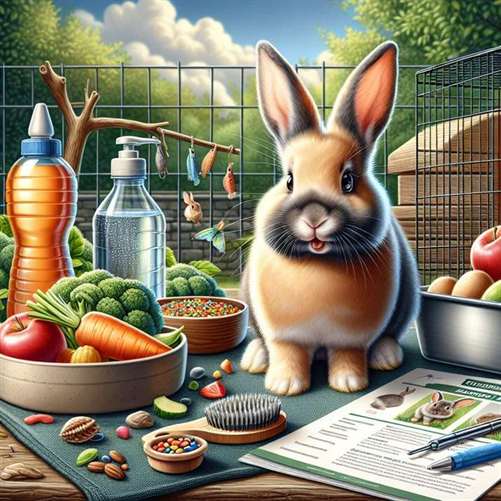Pet Rabbits Care: What You Need to Know
Introduction
Are you considering adding a fluffy friend to your family? If so, Pet Rabbits Care is an essential topic to explore. With an increasing number of households welcoming rabbits as beloved pets, understanding how to care for them has never been more critical. In fact, research shows that pet ownership can enhance emotional wellbeing and reduce stress, making it vital to delve into the specifics of pet care, particularly for rabbits, known for their gentle nature and playful antics.
In this article, we aim to provide you with a comprehensive guide to Pet Rabbits Care, offering insights into how to keep your furry companions happy and healthy. You will learn about essential care practices, dietary needs, housing requirements, and even some common health issues. By the end of this article, you’ll feel equipped with the knowledge to ensure your pet rabbit thrives in your home.
Key Takeaways:
- Understanding the basics of Pet Rabbits Care.
- The importance of diet and habitat for rabbits.
- Common health issues and how to prevent them.
- The emotional and social needs of pet rabbits.
So, whether you are a seasoned rabbit owner or a curious beginner, let’s hop into the world of Pet Rabbits Care together! If you want to know more about the different breeds of rabbits, explore different rabbit breeds.
What is Pet Rabbits Care?
Definition
Pet Rabbits Care encompasses all the necessary practices and considerations that ensure the health, happiness, and well-being of pet rabbits. This includes aspects like diet, housing, social interaction, grooming, and health monitoring. Proper care is essential to prevent common ailments and to promote a long, fulfilling life for your rabbit.
Historical Context
Rabbits have been domesticated for centuries, originally bred for their meat and fur. Over time, they transitioned into companion animals, especially in the 20th century when their playful and affectionate nature caught the attention of pet lovers. Today, rabbits are among the most popular small pets globally, with an estimated 2 million pet rabbits in the United States alone. This historical evolution reflects a growing trend toward recognizing rabbits not just as livestock but as cherished family members.
The Importance of Pet Rabbits Care
Understanding Pet Rabbits Care has gained prominence for several reasons:
- Rising Popularity: As more families opt for small pets, rabbits have emerged as favorites due to their size and temperament.
- Awareness of Needs: Increased awareness of animal welfare has prompted owners to seek better care practices, ensuring rabbits enjoy a quality life.
- Health Concerns: With rabbits being prone to specific health issues, knowledge about their care can prevent serious health problems.
Pet Rabbits Care in the Context of the Pet Industry
The pet industry has seen a substantial shift towards prioritizing the well-being of pets, and rabbits are no exception. Companies are now creating specialized diets, toys, and habitats tailored specifically for rabbits. This trend highlights the need for pet owners to stay informed about the best practices in Pet Rabbits Care.
Key Players or Contributors
Several organizations and experts contribute to the field of Pet Rabbits Care, including veterinarians specializing in exotic animals, animal welfare groups, and pet care brands. Their efforts help disseminate vital information and resources, empowering rabbit owners to provide the best care possible.

The Basics of Pet Rabbits Care
Housing Requirements
Creating a suitable living space is crucial for your rabbit’s well-being. Here are some essential tips:
- Size Matters: Ensure your rabbit’s enclosure is spacious enough for them to hop around comfortably. The minimum recommended size is 4 feet by 2 feet for a single rabbit.
- Safe Environment: The enclosure should be escape-proof and free from hazards like toxic plants, electrical cords, and small objects they might ingest.
- Bedding Choices: Use rabbit-safe bedding, such as paper-based or aspen shavings, avoiding cedar or pine, which can be harmful.
For more information on choosing the best habitat, check out pet rabbit housing best options.
Dietary Needs
A balanced diet is key to your rabbit’s health. Here are some dietary essentials:
- Hay: Timothy hay or other grass hays should form the bulk of your rabbit’s diet, promoting healthy digestion and dental wear.
- Fresh Vegetables: Leafy greens like romaine lettuce, cilantro, and parsley are great additions to their diet. Avoid iceberg lettuce, which offers little nutrition.
- Pellets: Choose high-fiber, high-quality rabbit pellets as a supplement, ensuring they are low in fat and high in fiber.
Knowing what pet rabbit food you should buy is crucial. Check out this helpful guide for specifics: What small mammal pet food should you buy?.
Grooming and Maintenance
Regular grooming is essential to keeping your rabbit healthy and happy.
- Brushing: Long-haired rabbits require more frequent brushing to prevent matting. Short-haired rabbits can be brushed less often but still benefit from occasional grooming.
- Nail Trimming: Trim your rabbit’s nails every few weeks to prevent overgrowth, which can lead to discomfort or injury.
- Dental Care: Offer chew toys and hay to help maintain your rabbit’s dental health, as their teeth grow continuously.
Social Interaction
Rabbits are social creatures that thrive on interaction, both with humans and other rabbits. Here’s how to nurture their social needs:
- Playtime: Spend time daily interacting with your rabbit. Play with toys or simply let them explore a safe area.
- Companionship: If you have the resources, consider adopting a second rabbit to provide companionship, but ensure they are properly bonded.
Common Health Issues
Understanding potential health problems can help you act swiftly. Here are some common issues:
- Dental Problems: Overgrown teeth can cause pain and lead to serious health conditions. Regular dental check-ups are essential.
- GI Stasis: A serious condition where the digestive system slows down, often triggered by stress or dietary changes. Watch for signs of reduced appetite or lethargy.
- Respiratory Infections: These can be caused by bacteria or environmental factors. Symptoms include sneezing, nasal discharge, and lethargy.
For tips on improving your rabbit’s health, refer to how to improve small mammal pet health.
Training Your Rabbit
Training your rabbit may seem challenging but can be incredibly rewarding. Here are some strategies:
- Litter Training: Start by placing a litter box in a corner where your rabbit tends to go. Use rabbit-safe litter to encourage use.
- Basic Commands: Use treats and positive reinforcement to teach simple commands like “come” or “no.”
Enrichment Activities
Providing mental stimulation is crucial for your rabbit’s well-being. Here are some enrichment ideas:
- Toys: Offer a variety of toys, such as chew toys and tunnels, to keep your rabbit engaged.
- Obstacle Courses: Create simple obstacle courses using cardboard boxes and tunnels to encourage exercise and exploration.
Future Trends in Pet Rabbits Care
As the pet industry evolves, so do the trends in Pet Rabbits Care. Here are some emerging trends to watch:
- Holistic Health Care: An increase in holistic approaches to pet health, including alternative therapies and natural diets, is gaining traction.
- Technology Integration: Smart pet products, such as automated feeders and health monitoring devices, are becoming popular among pet owners seeking convenience.
Conclusion
Caring for pet rabbits requires commitment and knowledge, but the rewards are immeasurable. By understanding the essentials of Pet Rabbits Care, you can ensure your furry friend enjoys a happy, healthy life. Remember to provide a safe environment, a balanced diet, regular grooming, and social interaction to keep your rabbit thriving.
As you embark on your journey as a rabbit owner, stay informed, and connect with other rabbit enthusiasts to share experiences and insights. For more information on small mammal pet care, visit our blog regularly for new tips and guides. Happy hopping!
Remember, every rabbit is unique, and their care may vary based on individual needs. Always consult with a veterinarian for tailored advice and regular check-ups to keep your pet in top shape.
Resource Links:
- bluecross.org.uk: … Both pets use different methods of communication, so they cannot understand each other. They also need different diets. And, unfortunately, …
- reddit.com: … 34 votes, 40 comments. Hi all! I’m considering getting a rabbit as it’ll be a sweet and convenient pet to have while I still live in a flat.
- spca.bc.ca: … Rabbits are active, playful animals who need a lot of space. Your rabbit should spend at least four hours each day outside of their enclosure.




0 Comments